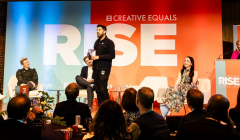
Are we leaving men and boys behind?
At Creative Equal’s RISE event, industry leaders consider how to reframe boys and men in marketing

Rod Sobral, Global Chief Creative Officer at Oliver, on the evolution of the in-house model, the danger of hiding behind the myth of the ‘big creative idea’ and the importance of hybrid thinking.

Built for efficiency, not creativity. When assessing the rise and rise of the in-house creative model at a distance, the industry narrative tends to focus on cost rather than creativity.
Yet, as Rod Sobral, Global Chief Creative Officer at Oliver, explains, while the company absolutely has driving efficiency and growth for its clients at its core, “creativity can’t be separated from that.”
“I do believe that in-housing or being as close to the brand as possible is definitely not a trend anymore. It is something that is constantly evolving,” he says. Noting: “When you look at where the industry is going, brands now are evolving faster than advertising agencies.”
Sobral was talking as part of the Game Changers interview series and in a wide ranging interview with Gareth Moss, founder of The Blueprint, Sobral lifted the lid on both his creative inspirations and the talent he believes will drive the industry forward.
Notably, as a creative leader who has spent much of his working life in advertising agencies, Sobral is not wanting to “throw stones” at the industry. However, he points to an evolution and the shift in more people wanting to be on the brand side as a positive evolution.
In January this year the ‘brand-tech’ group You & Mr Jones acquired a majority stake in Oliver’s parent company Inside Ideas Group. Sobral, who joined Oliver in February last year, is responsible for the agency's global creative output.
Oliver was at the forefront of brands building in-house marketing capabilities. Founded in 2004 its model was equal parts disruptive and hotly contested. With Sir John Hegarty pouring cold water on the rise of the in-house model by declaring that creatives choosing to work in house will end up working “with the most boring creative people you will ever meet.”
It’s a view that was quashed succinctly by Emma Perkins, Head of LEGO Agency EMEA last year, explaining that moving brand side, far from being a boring decision, was actually about being “more ambitious”.
When you look beyond the binary in-house vs traditional agency debate, a more interesting shift emerges. It’s a move towards a commercial creative model which is more hybrid than the either/or debate would suggest.
“I believe in hybrid thinking,” explains Sobral, who notes that technology is the only thing that consistently disrupts the marketplace. He believes that this technology creates new languages for creativity. “You can't think about the storytelling side if you don't also think about the systematic side or you are doing half your job,” he adds.
Sobral’s approach underlines the fact that brand technology and creativity are not mutually exclusive pursuits. “Oliver is not just known for its incredibly disruptive model but also its work,” he notes. To this end Sobral is focused on ensuring that the creative product is as good as the model.
Taking aim at the “mythical idea” of the one big creative idea solving everything in advertising, Sobral urged the industry to embrace “hybrid thinking” and not hide behind the search for the big idea. Pointing to the brand ecosystem of Beats by Dre, which he was instrumental in building at R/GA, he shared that the music industry is a huge source of creative inspiration to build more fluid ways of working. Sobral also takes inspiration from designer Virgil Abloh and admires the “storm” he has created in culture and creativity.
For Sobral, creative talent of the future needs to focus on “being a hybrid thinker” which extends to not just having a love for storytelling, but also for human behaviour across multiple platforms.
He explains: “To be successful you need to understand the medium, you need to understand the environment. It drives me crazy when you see creatives just trying to dump storytelling into social platforms.” Sobral notes that “every medium has its own language and grammar”, a fact which demands a more hybrid approach from creatives.
Taking a clear aim at the industry myth that driving diversity means not putting quality first, Sobral speaks eloquently about the need to “act and commit to change”. “Our skill is not a gift that you are born with; it’s practise and rigour and learning,” Sobral explains. “We have the responsibility to train people and reach out to people.”
It’s a commitment that Sobral so clearly demonstrates that raises the bar, both for the industry and its creative output.
In a highly competitive industry, it is not always easy to take the time and space to think critically about leadership capabilities. Or to give critical thought to the leadership structures and mindsets that give a business the best conditions to thrive.
With this in mind, The Blueprint has teamed up with Creativebrief to launch the Game Changers interview series. Each month we will be delivering insights from the industry’s leading game-changers who think and act differently and are unafraid to challenge the status quo.
Looks like you need to create a Creativebrief account to perform this action.
Create account Sign inLooks like you need to create a Creativebrief account to perform this action.
Create account Sign in